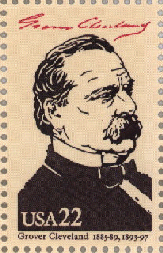Federal Intervention in Pullman
Olney wanted to send Federal troops to Chicago, and got his way when he received a telegram from Judge Grosscup, Edwin Walker and the Federal district attorney, saying that no agency but the army could protect the mails. There was no proof of the statement, but President Cleveland was convinced and sent the entire command from Fort Sheridan
out for active duty in Chicago, on the morning of July 4. This enraged
Governor Altgeld and the ARU. The Constitution gives the President power
to send the army into a state " on Application of the Legislature, or of
the Executive (when the Legislature cannot be convened)" in order to protect
the state "against domestic Violence[67]".
Altgeld protested that neither he nor the legislature had asked for help.
He told the President that the railroads were paralyzed not because of
obstruction, but because there were no men to operate them. He also pointed
out that the newspaper reports were exaggerated if not fabricated. Finally
he argued that "local self-government is a fundamental principle of our
Constitution. Each community shall govern itself so long as it can and is
ready and able to enforce the law.[68]"
command from Fort Sheridan
out for active duty in Chicago, on the morning of July 4. This enraged
Governor Altgeld and the ARU. The Constitution gives the President power
to send the army into a state " on Application of the Legislature, or of
the Executive (when the Legislature cannot be convened)" in order to protect
the state "against domestic Violence[67]".
Altgeld protested that neither he nor the legislature had asked for help.
He told the President that the railroads were paralyzed not because of
obstruction, but because there were no men to operate them. He also pointed
out that the newspaper reports were exaggerated if not fabricated. Finally
he argued that "local self-government is a fundamental principle of our
Constitution. Each community shall govern itself so long as it can and is
ready and able to enforce the law.[68]"
But the President shortly answered that the postal authorities had asked for the removal of obstructions to the mails, that Judge Grosscup had asked for help in enforcing the injunction, and that there was "competent proof that conspiracies existed against commerce between the states[69]". Grover Cleveland argued that any of these conditions was enough reason to justify sending Federal troops into Illinois. Although Altgeld was powerless against the army, governors of four other states made similar protests. It was a political and ethical issue as much as it was constitutional. For even if the President had properly enforced the law as it was at the time, his actions seemed very biased. The Federal power was used to break the boycott, while no action was taken to incline Pullman or the railroads toward a peaceful settlement.
So the army ruled in Chicago - along with five thousand special Federal deputy marshals. Since these temporary jobs were unattractive to most men, they were taken by petty criminals and other untrustworthy types. They were said to fire without reason into the crowds, randomly kill bystanders, and steal property from railroad cars. The result was chaos. There was more serious violence after the army arrived than before. The army and special deputies were supposed to keep the peace, but did just the opposite.
The boycott went on for another week, while at Pullman the leader of the original strike announced that they were being starved into submission. On July 17, Debs and his colleagues were arrested a second time, this time for violating the July 2 injunction. They refused to post bail and were imprisoned. A day later a notice was put up on the gates of the Pullman shops: "These gates will be opened as soon as the number of operatives is sufficient to make a working force in all departments.[70]" It was the end of the boycott. One out of four of the men now hired at Pullman had not worked there before the strike. Every applicant was forced to sign a pledge that he would not join any union. A thousand former employees were left with nothing. Governor Altgeld appealed to the Pullman Company to help them, but got no reply. He then asked the public for a relief fund, and even the Chicago Tribune helped in raising it. Eugene Debs went to jail for six months for having violated the injunction.
But the end of the boycott was not the end of its larger meaning. A Federal investigating commission appointed by President Cleveland denounced Pullman's refusal to arbitrate the dispute, after hearing testimony from railroad officials, strikers, union leaders, and public servants. The report urged compulsory arbitration as an insurance against future railroad strikes. The commission concluded that ultimate responsibility "rests with the people themselves and with the government for not adequately controlling monopolies and corporations, and for failing to reasonably protect the rights of labor and redress its wrongs.[71]"
Four years later, the supreme court of Illinois passed judgement on one element that had led to the Pullman strike. It held that the corporation had no right under its charter to construct the town of Pullman, and ordered the Company to dispose of all property not required for its manufacturing activities. The court said that company towns such as this one were "opposed to good public policy and incompatible with the theory and spirit of our institutions.[72]"
